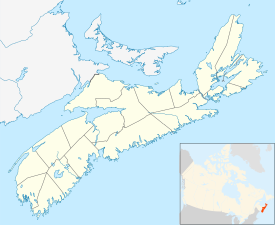Barrington | |
|---|---|
| Coordinates: 43°33′46″N 65°33′42″W / 43.562778°N 65.561667°W[1] | |
| Country | |
| Province | |
| County | Shelburne |
| Municipal district | Barrington |
| Population (2006)[2] | |
• Total | 3,856 |
| • Change (2001-06) | |
| Time zone | UTC-4 (AST) |
| • Summer (DST) | UTC-3 (ADT) |
| Postal code(s) | |
| Area code | 902 |
| Access Routes | |
Barrington is an unincorporated Canadian rural community of about 4,000 people on the northeast corner of Barrington Bay[1] in Shelburne County, Nova Scotia.
Barrington is part of the much larger Municipality of the District of Barrington, also wholly within Shelburne County.
History
Barrington's inhabitants are mostly descendants of the first settlers from Chatham and Harwich on Cape Cod, Massachusetts who emigrated to the area during the 1760s. One such settler was Solomon Kendrick, father of John Kendrick, explorer and maritime fur trader. Solomon moved from Harwich, Cape Cod, to Barrington in the 1760s.[3]
In popular culture
Disguised as "Barringford," Barrington is the main setting of Canadian novelist Hugh Hood's debut 1964 novel, White Figure, White Ground.
See also
References
- ^ a b Nova Scotia Geographical Names: Barrington[permanent dead link]
- ^ Government of Nova Scotia: Barrington
- ^ Ridley, Scott (2010). Morning of Fire: John Kendrick's Daring American Odyssey in the Pacific. Harper Collins. p. 5. ISBN 978-0-06-202019-2.
External links









